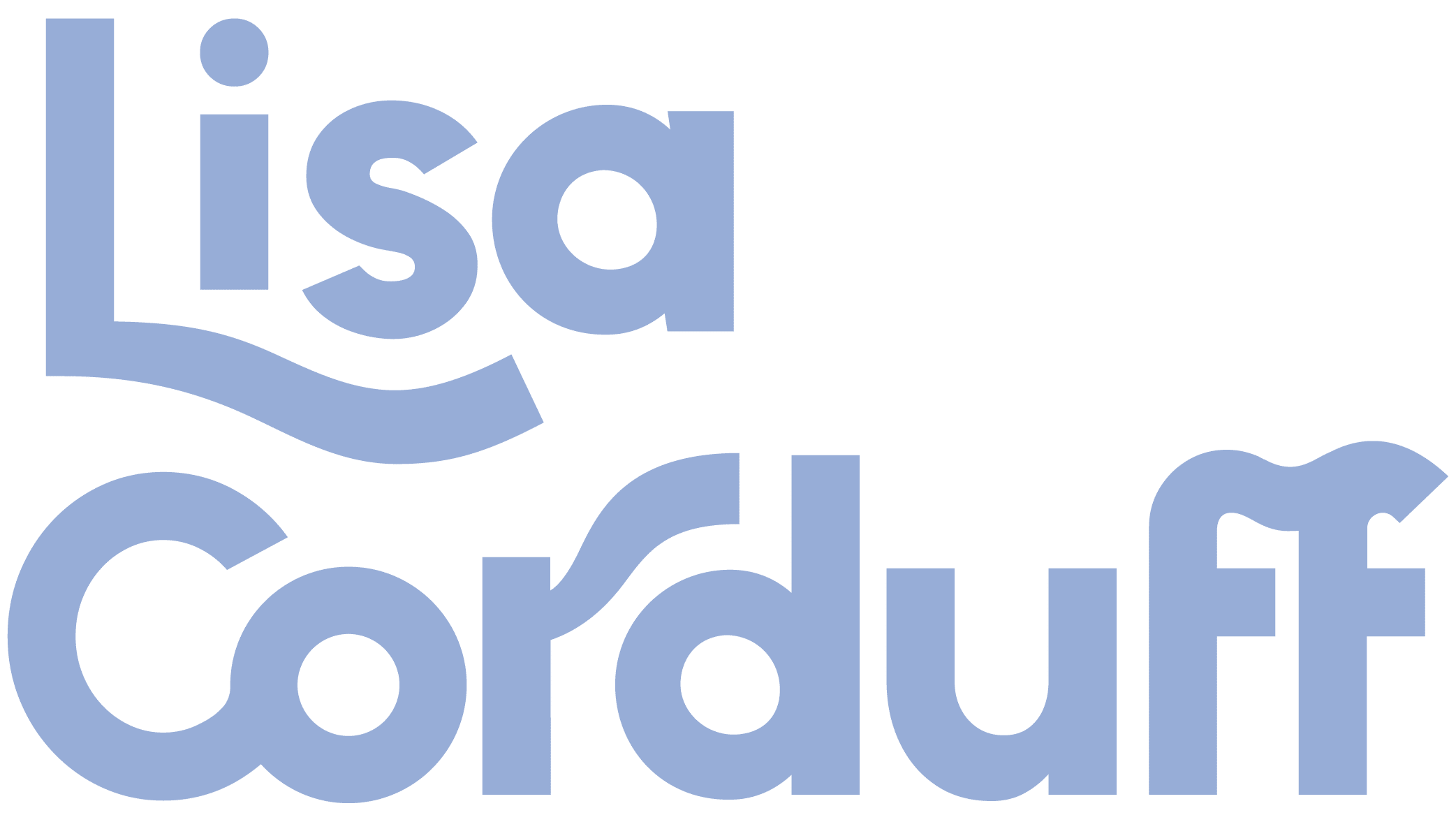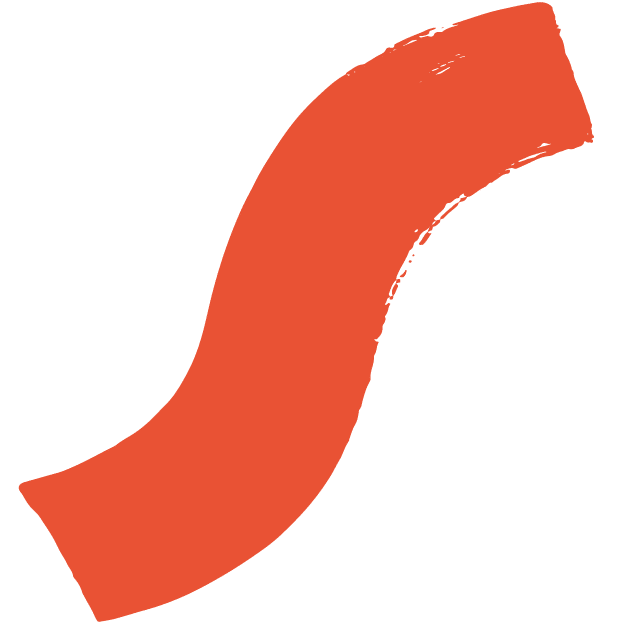
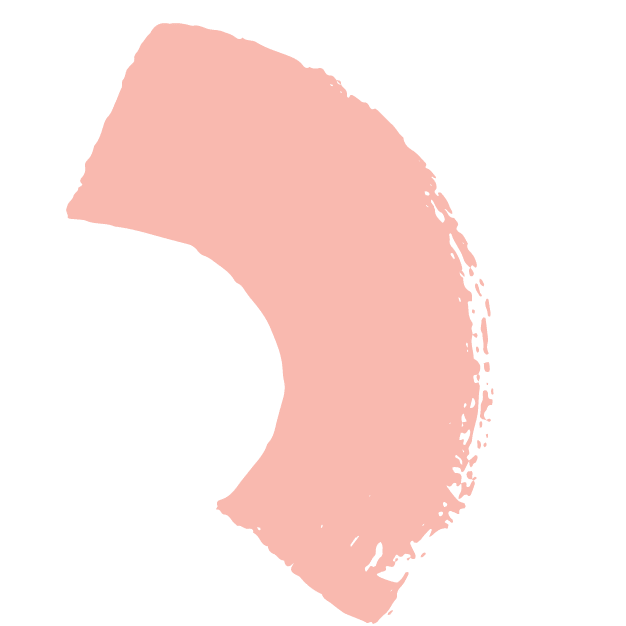
Never miss an episode! Subscribe and listen on iTunes, Stitcher or Spotify.
When we are too attached to things being a certain way it can cause unnecessary suffering. But don’t take it from Lisa – take it from Buddha!
In this episode, Lisa explores her big lessons on Attachment.
She shares where she held on to particular attachments in her marriage and family and how ultimately she had to learn to detach.
Hear about the three types of attachment Lisa experienced (they are universal!) and exactly how the Eightfold Path illuminates much of the work she has undertaken to create freedom in her life.
Links:
Want to get started on a path back to yourself? Jump straight into Back to You, Lisa’s simple, highly effective and empowering program completed by women who are done with overwhelm and prioritising everyone but themselves.
Continue your conversation with Lisa:
Know someone who would love this episode?
Share it with them here (um, and a hefty handful of stars would be greatly appreciated!)
Prefer to read? Access the transcript here
Hey, it’s Lisa Corduff. Welcome to the podcast, where you can expect inspiring, raw, energising and transformative conversations with people on the path of personal evolution. I’m here to really live my life, and if you are too, these conversations are just for you. I’m really glad you’re here. Enjoy. Hey, everyone.
Welcome to another episode of Lessons So Far. Oh, so many lessons. I feel like this series could potentially go on forever. It won’t, but thank you for all of the feedback that you’re giving. If something particularly strikes a chord with you, you know you can always share it with others. I love when people screenshot episodes and write how it affected them and share it on their socials and tag me so I can see it and share it as well. It really makes a difference, especially when, these sorts of episodes.
I am sharing stuff that sometimes I can definitely feel a little bit vulnerable, but here’s what I’ve always known, and a mentor taught me years ago actually, was that what’s most personal is most general, so all of us are going through stuff, whatever it is, and getting a bit granular like digging down into things, even although my experience isn’t your experience, the more that we share about things at that personal level, well, what I find over and over again is that is what more people can relate to. It’s the stuff that sits over the top that’s interesting and helps us kind of, we can have a moment or two, but that deep connection, that those deeper insights happen when we get personal, and for a long time, I hadn’t really wanted to go there with all this stuff because I was in it. I was in the process of figuring myself out. I mean, it really, and it’s still ongoing, but I needed to get to the point where I actually really sat with myself and distilled a little bit of what’s been happening and shared it from the most honest place that I could so that we could have conversations at a different level, and from your feedback, it has really helped me know that there’s a power in that, you know? You hear parts that resonate with you. You can have actual shifts from that.
Awareness is always the first step to change, and that’s what we do in … It’s a really important part of the Ready for Change programme. I hope that you are getting insights from this, otherwise you’re just really along for the ride of me sharing a bit of my life story. Today, the lesson that I want to talk about is attachment. There’s sort of, there’s two different episodes on attachment because one attachment is the one I’ll be talking about today and the other attachment is attachment theory, so many of you would be aware of attachment theory.
This is not what I’m going to be going into with you today. In fact, I think I might bring an expert on to talk this through. I know when we bought the amazing Isiah McKimmie into the Live the Change programme, which is my six-month coaching programme that sits behind Ready for Change. If you’re a Ready for Change grad, you can get access to Live the Change, and she did an amazing presentation for us about attachment theory. I’ve found this a fascinating area to explore, really fascinating on so many different levels, really helps you understand the ways in which you relate to people and it was something that Nick and I became very aware of in marriage, and on the other side of that, there’s been a much deeper exploration as I found myself with someone with different attachment style to me and the way in which we’re working towards more secure attachment with each other, It’s a fascinating place to be, and I’m glad I’m with someone who is wiling to be on that journey because I certainly didn’t want to stay in my old patterns of attachment.
It’s hard to shift. Anyway, that’s just, that is another, a whole other episode or series in itself. Today, I wanted to talk about attachment, I guess kind of in the way that Buddha talks about attachment. It’s really a definition that I saw online, was that attachment is a strong, uncontrollable desire that causes suffering because it steals our inner peace, serenity and freedom, and Buddha said the root of all suffering is attachment, but there’s this acknowledgment that life is a suffering, so it’s not like trying to avoid suffering, but how, like disease or things happen. We feel all sorts of emotions, but when we find ourselves attached like unable to kind of detach, it can just cause so much unnecessary suffering, so what I’m going to do in this episode is explain a little bit about where I was experiencing attachment and break down the three … Have you …
A lot of this are discovered that I was doing stuff, and I’m actually going to read to you at the end the Eightfold Path that Buddha set out, but his Four Noble Truths informs a lot of … Well, you know when you don’t even realise that you’re doing something, and then I was reading Four Noble Truths and it’s like, “Oh, gosh, this is the whole path that I feel like I’ve been on,” but there’s a break down of three different types of attachments, and I’m just going to talk through them because it provides a really clear way of exploring the different ways in which attachment was really affecting my life, and then what helped me move through it, what helped me. I’ve mentioned before in this series a little bit about attachment, but we’re going to be going a bit deeper today. I guess where I felt attachment was I was absolutely attached to the idea of Nick choosing sobriety above all else, and I was attached to the idea of our family staying together, really, like our family thriving through this challenge. There was a big attachment to that, and also, I was really attached to me being the solution to all of this, me finding ways, like me being the answer, the saviour of it all.
There was all these different levels of attachment. I’m only going to be focusing on a few areas, but I mean, we’re all, all of us in all the ways that we’re so attached to healthy children or attached to the results we’re getting in things, or there’s just there’s so many different ways in which this plays out. Let me go into these three different areas. There’s craving, aversion and ignorance. When I look at these, I can very, very clearly see how I had all those attachments. The craving, that was really this, I mean, full-blown desire, this unquestioning of my marriage to Nick, absolutely also around his sobriety, and this idea of just desperately wanting things to work out, you know?
I just, I didn’t see that there was any other option, which is one of the other forms of attachment, which I’ll just get to, but there was this, the craving aspect is, “What are you desiring that’s almost, it almost becomes ridiculous?” Like you’re holding on to this idea of something. Family, success to me meant a marriage that lasted, and I ended up having to shift that and allow myself to detach from my idea, my story of what it meant to love someone and allow myself to see love evolve and be experienced in a new context. I mean, I had to let go of my, this cravings, desire for his sobriety, this nothing else matters, except his choice to stay sober, and I will do whatever I need to do to make that happen. I mean, you can see the suffering that would be involved in something like that, like wanting something so bad that you have absolutely no control over. Where in your life are you doing that?
Where are you putting so much attachment on an outcome that you literally, you’re causing a suffering for yourself by being so attached and you actually have no control? What might it mean to let that go? Without a doubt, I was caught up in that style of attachment. I was attached to the way I thought my life was going to go, to a vision of the future. I couldn’t figure out how it could be any other way than Nick and I together, married, healthy, raising our children, living out our dreams, staying committed to the promises that we made to each other. I just, I was so attached that it ended up, I had this moment where I realised, “Oh, I’m actually continuing to choose this,” and it’s not healthy anymore, but it took me a long time to get there, so let me talk about aversion.
This is when we’re trying not to feel unpleasant emotions. I absolutely felt a separation from my life, kind of, like there was this desperate attempt to ride the waves of emotion, but not fully feel them, because if I did, I would realise it wasn’t working and I was attached to working out, remember? There was this absolute aversion to feeling fully the unpleasant feelings, and so I was living on the surface of my life, and I’d be talking about this a lot like before he even had the diagnosis of an alcohol disorder. I just, I couldn’t fathom. I knew that there was a problem, but I wasn’t ready. There were times when I was really sad and very confused, but then, a lot of the time, I was just kind of getting on with life, you know, getting on with the vision that I was attached to, without allowing myself to fully feel.
It’s why I talk a lot … Like there’s so many clues for us about life and how it’s happening in the present moment when we actually allow ourselves to feel what it is that we need to feel. It’s why if you went to my programmes, it’s what I encourage. It’s not about not feeling what we need to feel, but it’s also not getting attached to being in a certain feeling for a long amount of time. Feel it, move it, get the clues from it, and then create space for something new, but I was sort of on the path of, “This isn’t happening. La, la, la, la, la, la, la, la, la.”
I mean, I can remember when he was diagnosed as an alcoholic, and I was like, “No. No. Surely not. Surely not. Surely we wouldn’t ever be able to visit a winery again and do some wine tastings like normal people do,” or, “Surely like …”
I mean, I found it hard to really go, “Oh my God. Yeah, it’s life has changed forever.” I mean, I did and I didn’t. Then, the last type of attachment that is in these, the Four Noble Truths is ignorance. This is like being unable to see just the nature of the world or yourself, so really just not acknowledging reality, and that’s nothing to see here.
I couldn’t admit fully that it wasn’t working. I couldn’t admit fully that things had changed fundamentally and everyone was going to be better if we actually just really fully acknowledged what was going on, and here’s the thing. I feel like I started to go down that path, but then, the person who I was with wasn’t able to, so there was a deep denial going on for both of us in the beginning, and then as I started to really see this play out, Nick still found it very, very hard to accept that he was going to have to live a fully sober life. When that happens, there’s literally nothing that anybody else can do. The decision has to be made by the individual, and I would say that’s the thing that got in the way most of his recovery, and it was the thing that I would talk to the professionals who were helping him about and just wishing it was another way, but acknowledging that that was his job to get to that place, and I thought he was there a few times, and addiction is a bitch.
It just really, really is. It just messes with you so bad. So you can see here that the whole attachment thing, pretty strong, those three areas. I mean, you can just jump online and look at the Four Noble Truths and you’ll see these breakdowns of craving, aversion and ignorance as different types of attachment, like the way it can play out, and when I looked at them, I absolutely saw myself in them, so what do we do about it? I mean, bloody … Don’t ask me.
Buddha lays it all out, but I thought I would share a little bit about the things that I started to … Before I knew that Buddha had literally laid out a path for me, I started to do things that you can easily start doing when it came to just lovingly detaching from certain things. I think the first thing that I started to do, and if you’ve been around a while, the December that he was in a rehab for five weeks … I think I mentioned this on an earlier episode, right before Christmas, so all through December, and I did the 12 Days of Happiness instead of 12 Days of Christmas. I did the 12 Days of Happiness, and this was really it for me.
It was me starting to seek happiness outside of the context of my marriage, Nick’s choices. It was me coming home to me, and if you have done my Back To You programme, which you can get right now, we’ll pop a link in the show notes, you can go and do that programme, and that programme, years before this stuff was fully going down, well, I mean, I had been doing the work and I created Back To You and launched it obviously, if you listen to the story so far when things were absolutely spiralling out of control, but it was all of those steps that I was taking, just coming back to, “Hang on, I need to think about myself here. Why aren’t I on my own priority list? Why is everything on my to-do list for other people, or to keep something afloat or to, like as an output? Why am I always productive?” That’s the overfunctioning thing that was in a previous episode as well, and I started to really just open up a dialogue with myself.
I started to just think about literally, what made me happy, without context or reason, just Lisa. What were the things that brought me back into peace? My journey to find all of the good stuff in life started to become an inner experience. It started to become independent of what was going on around me. It started to become this curious exploration of like who I actually am, and it was gentle and it wasn’t overnight, but it was helping me figure out, “Whoa, so if my happiness, my idea of success isn’t wrapped up in things I can’t control, it isn’t wrapped up in how good my relationship is at the time, it isn’t wrapped up in whether he’s in relapse or sober, what is it? What is it then?,” and so begin this beautiful journey of coming Back to Me, so go get that programme.
It really does … It’s really a beautiful starting point of that, and obviously, Ready For Change, which we will be launching again in October, so get ready for that, is the fireworks that really took everything to a completely new level for me, but it really, moving through and getting less attached to the things that was causing me suffering, and when I realised that I could foster this with inside myself, that I had a reserve, that I had this relationship to work on with myself, when it came the time that Nick said he was going to be moving out and this was the way it was going to be, and I just, I guess I was glad I had been on that journey. I had been starting to lovingly detach from … But I mean, it still, as I explain, hurt like, oh, so much, but I knew I was going to be okay because I’d been in the process of dropping my attachment to him and his outcomes to our family, looking a certain way to good, loving, being marriage with him. There was one particular moment that I remember, and I think I explained this on a previous episode.
It’s all a bit of a blur, all of these episodes now. So much emotion in the story so far, but the other thing that helped was practising this idea of letting go, because I think if you’re someone who is specifically attached to something, working out, like you might be attached to your job, to the title or the role that you have and what it gives you to have that, and then it gets taken away, and you’re absolutely lost. The practise is really knowing that you are separate from all those things, that you are being an entity that exists and at different times, you do different things, you’re with different people, you’re experiencing … Sometimes you’re experiencing pain, sometimes ecstatic joy, and just not getting attached to anything, being forever or you needing that to feel some sort of contentment, peace in your life, right? I found letting go really just supersonically hard. Like how do you even do that if you feel like you’re the person?
Like the dialogue in my mind was like, “I can’t because what if?” What I realised now is that I was never the person. I was kind of a sideshow, but I centred myself. I was always a sideshow, and as I started to realise this, like I realised that addiction was far more powerful than the love that he and I shared, which really, I mean, that really hurt when I realised that all the effort I could put in was worth actually nothing if he didn’t join the party, when I started to really let go of myself as the centre of this storm and realised the storm was happening and I was witnessing, I started to feel weirdly more peaceful. I started to let go of the control of the attachment to me being something here, that me being some sort of solution. As I witnessed myself parenting, I can absolutely see this playing out with my kids, you know?
Like we want to centre ourselves in their lives, and we have such an important role, but ultimately we are a sideshow in their life, and it is absolutely okay for that to be the case, and to find an unattached kind of place, knowing that they’ll make choices. Like I make choices that my parents must think like, “Lisa, what are you doing and why? For the love of all things, why?,” but that’s okay. It’s okay. Let me just read out … Those two things helped. Finding happiness started to become an inner experience.
It’s something that I started to cultivate, and happiness is my word, but it can mean whatever it is that you’re sort of searching for, that you feel like your attachments in life are causing you to feel not peaceful or not free, and then letting go, which is so hard, but really starting to look at, “Okay. Now, I’m continuing to choose this. Now that I’m aware of it, is that what I want to do, or do I need to find ways to just lovingly detach here?” Let me, in the Eightfold Path, which this is not any my teaching at all. This is all sort of … This is the last path, and it’s all about the awakening sort of path.
Yeah, let me just read through these. There’s, how many? Eight, because it’s the Eightfold Path. Let me just read this. I’ve just got these … I just looked them up on the internet, so I had them here for you.
The first one is right understanding, so seeing your mind, body and the world as they truly are, so this is really big for me, as someone who maybe put her head in the sand or maybe wasn’t even of the planet as I was just kind of floating around, ignorantly hoping that things would change, denying what was real, not being in touch with my body at all, at all, not being able to listen to it, not being able to honour it when it was tapping me on the shoulder saying, “Hold up, sister. Take a freaking break,” or, “Hold up, sister. We need more pleasure. Where are you … This doesn’t feel good.”
Right intention, so this is a commitment to cultivate the right attitudes, and I think of this when I was looking at all this going, “Oh my gosh, this is just, this is everything. This is what I feel like the women in Live the Change are working through.” It’s like this is where we get to choose how we approach things, right? A commitment to cultivate the right attitudes. It’s like me choosing lockdown of fun for this, what is now an extended lockdown period in Melbourne, but like remembering that we can commit to bringing a certain intention, a certain feeling to situations.
We absolutely get that, and a commitment to cultivate the right attitudes. When it came to the marriage, it was like I don’t think that this is an ending, this is an evolution. This is not a failure, this is an evolution. This is just where our relationship is at right now, so much peace. It’s like we can choose the story, right? Number three is right to speech, so that’s speaking truthfully, avoiding slander, gossip, offensive or abusive speech.
I mean, I think our words are so powerful. I teach this in Live the Change. I think our words create our life, and we should be very, very careful about the words that we use, but also this whole path to me, coming to the point where I can just take off the mask or remove anything in the way of me standing in my truth as a woman, I think is so important. I want to talk over things. I don’t want to talk around.
I just, I want to talk truthfully, and thank you for witnessing that as I share these podcasts. Then, there’s right action, so on this page it says refraining from crime, murder, overindulging in sensual pleasure, behaving with peace and harmony, so I would absolutely say that harmony is my end goal in most things. I like harmony. I like the feeling of things feeling harmonious, but where I am right now in my life is that I won’t sweep things under the carpet to get it. I’ll look at stuff.
I’ll see in stuff, and I’ll have conversations instead of that sort of ignorance lever of attachment like, “This isn’t happening,” “I don’t want it to happen because I want harmony.” The sensual pleasure thing, I think … I mean, I struggle with that because I do absolutely think that there is enormous life force power in sensual pleasure. I believe in it as an activator of good things. I don’t think it’s the be-all and end-all of relationships, but as someone who’s … One of my core love languages is physical touch.
For me, it’s always been a really important part of life and growing me, so yeah. I’ll work on that, Buddha, but for right now, especially through lockdown, so let’s just get the joy wherever we can get the joy. Maybe he’s talking about it in more nasty ways, but for me, that part of life is actually really important and actually put a lot of … Well, I think if it’s something that’s important to you, you have to cultivate it, right? Anyway, number five is right livelihood.
This is just like don’t live in ways that cause suffering, and for me personally, with this business, especially everything I’ve been learning about privilege and having a platform and sharing things, how that’s received by now tens of thousands of people sometimes during launches, a lot of people, hundreds of thousands of people see, might be invited to a webinar or something like that, and I’m really committed to learning more about how I can do no harm in my work, and yeah, that’s a big focus for me right now, and I just wanted to pop that in because I don’t think in any other ways, I am … You know? Well, I think actually all of us right now are looking at ourselves in the way in which we live in the context of our climate and environmental degradation and all of those sorts of things, so yeah, that’s an area. Still working on that one. Right effort, so this is cultivating skillful or wholesome qualities like compassion, kindness and wisdom as opposed to craving, aversion and ignorance. This is where it’s really sort of setting out, “Okay, if you are in attachment around those, the craving, aversion and ignorance areas, how about cultivating compassion, kindness and wisdom instead?”
I think that for me, that was very much begun with the journey with myself, that I can extend to others, but I do believe we need to be compassionate and kind to ourselves in order to recognise our own inner wisdom and make decisions based on intuition and that inner guidance, that gut nudge. Then, when we do, it’s so much easier to live, I mean, when we are our own best guide, but that’s takes a lot of practise, and for someone like me, I was caught up in a long time of all of those attachments of my whole focus being on the outcomes that I wanted to see, that I didn’t have any room. I didn’t have any room. I wasn’t at all developing that, cultivating that within myself and any of my programmes that you would join, anything that you would see is really about that, that journey back like, “Hold on. It’s all inside.” All the answers are actually within you.
It’s just that we kind of lose sight of that. Right mindfulness, so this is developing awareness of the body, sensations, feelings and states of mind. This is getting to know yourself. Oh, I mean, how many times, if you ended up, like that whole going on holidays, and then crashing and getting sick and stuff like that? Was it because you weren’t paying attention of the months leading up to that about what your body needed?
We really have this opportunity. I think so many of us just accept certain symptoms that are actually the signals of something that your body is trying to tell you, and it can be the most beautiful thing you can do to yourself. I mean, recently, I think I had been justifying a level of tiredness that I’d kind of normalised for myself grief, 2020 lockdowns, solo parenting three kids, all of that sort of stuff, and until I was like, “I just don’t think this is normal. I don’t think I should get out of breath changing the sheets on my kids’ bed,” and I went … Blood test revealed grossly anaemic and that I needed an iron infusion stat, and my body had been telling me all the time, it’s just that I had normalised it. I had talked it away because of other things.
We don’t want to do that. We really want to honour our body. We want to honour what we’re feeling, just being aware, being curious to it all, and then the eighth one is right concentration, so developing the mental focus necessary for this awareness, practising meditation. I’m so glad that a few years ago, I started on that practise, very much a practise, but it is. I mean, I sort of see now so much is mentor, wherever our head is at is kind of where we are, and for me, what that practise developed was this chance to listen to myself, to quieten things down amongst the storm, this little moment that I have, and so I do it in the morning when I wake up.
I just put earphones in my ear and do a little meditation or self-hypnosis, and it just centres me, just gives me a moment to connect in, and it’s just, it’s been a big part of me, connecting back to myself once again. I wanted to … I’ve used kind of these frameworks to talk to you about this idea of attachment because I could have gone in a million different directions with this, but I felt like if I was explaining it from good, old Buddha’s point of view, and it would give you somewhere to go. If any of this resonates and you want to continue the path, a lot of this is what I do with women, and the, as I said, the Back To You programme is such a simple, beautiful way to get started with this process. You could read the Buddhist teachings.
I certainly didn’t at the time. It’s only something once I discovered it, it seemed to explain a lot of what I was taking myself through and what had been bringing me back to peace. Obviously, Ready for Change is a really big part of that. Like it’s all about what you’re choosing at a mental level for yourself. Live the Change dives deeper, and for anyone who has completed Live the Change and got access to those six core modules that I teach, the areas that totally changed my life, the disciplines almost that I adhere to, there’s much of it resonates with this.
Like you’ll hear things in this, but I guess I just have interpreted it in my own way. It’s certainly not a Buddhist programme, but there’s similarities. There’s things that I’ve collected along the way that absolutely fit in here. Dropping attachment right now in my life is, even just thinking about being in a new relationship and knowing that I’m not attached to it being a relationship for the rest of my life. I am here for it in the present.
I am always checking in with myself to how it’s feeling, to what needs to be said like, “How am I responding in this situation? What am I getting curious to? What am I learning about myself through this? Is this helping me? Am I totally open and aware, instead of experiencing aversion, not really seeing what’s going on?”
It’s one of my biggest fears, I would say, actually in relationships, because I felt like I knew someone, and I didn’t. Yeah, I mean, we’ve all got our stuff, right, but I’m not … I’m in it for growth. I feel it’s not the source of my happiness, I am, and I lovingly detach from it being some sort of idea of relationship that I thought was a good idea in the first place, you know? We can be so much more open. I think about attachment with my kids like I’ll do everything that I can, everything within what is possible for me to create harmony, to have them feel loved, to support them, but I am not attached in any way to what they’re going to be, what this ride might look like for them, what their choices are going to be, and that is a practise, [will 00:46:41].
I guess for you, I wonder how any of that resonated, whether you can hear through my sharing, what you might be attached to that’s causing you unnecessary suffering, and are you cultivating that happiness within yourself? Are you coming home to yourself? Do you have loving, compassionate conversations with yourself or are you just hard on yourself all the time? You attach to yourself being a certain way, to life looking a certain way, your house, your job, your family unit. Dropping that attachment, letting go is absolutely not super easy for many people, but sometimes it can be the most liberating thing that you will ever do. I hope you’ve enjoyed that episode. See you soon.
Hey, thanks for listening to that episode. I definitely hope you enjoyed it. Now, I wanted to let you know that we have a bunch of free stuff available for you at the website. You can go to Lisacorduff.com and check out my Free Stuff section, and download something juicy to help you with your transformation. You can also go to our Programmes page, where I have made available some never sold before workshops and a bunch of short courses to help you with things like creating extra time in your week, moving through your overwhelm, getting on top of your tech habits and getting unstuck.
I’m here to help and we’ve got brand new ways for me to do that beyond this podcast, so go to Lisacorduff.com and check it out. Hey, if you’re enjoying the conversation, then it would mean the world to me if you head over to iTunes and give us a rating and review. It really makes a difference, and it’s my intention to get as many of us involved in real conversations that really change the game as possible. Thanks so much for your help and I’ll see you in the next episode.
Hey! I'm Lisa
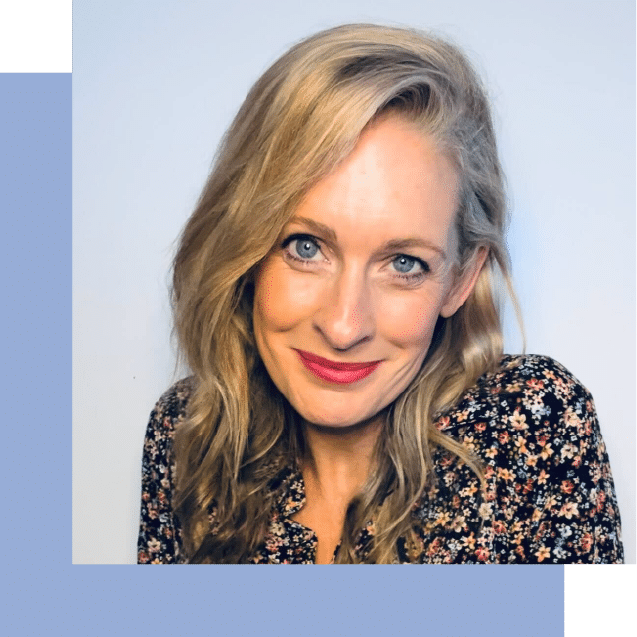
Thousands of women have transformed their lives using my programs and workshops.
Whether you’re seeking a quick shift or a full deep dive (with the transformation to match), you’ll find tools and training that can help, right here...
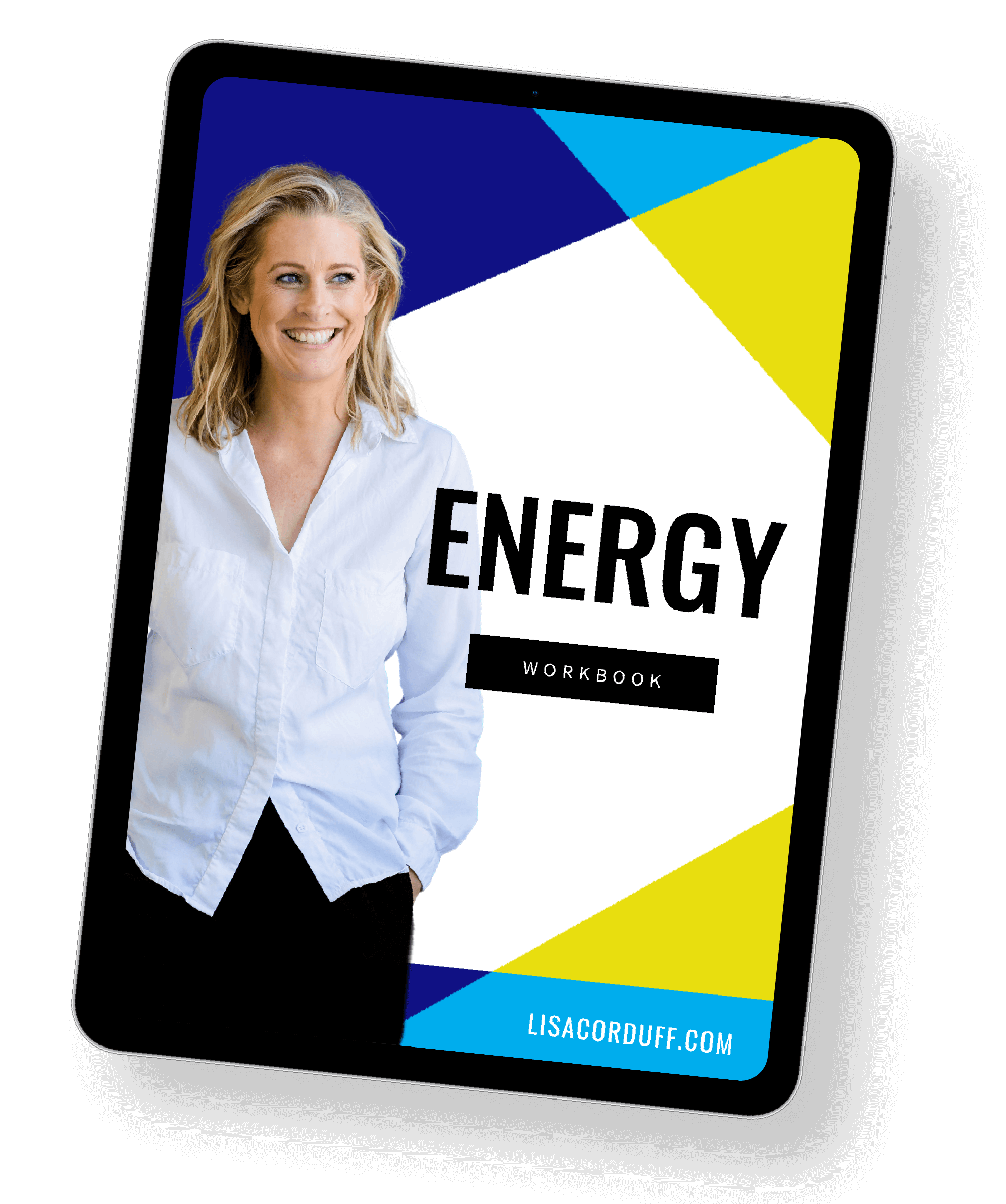
FREE Energy WORKBOOK
Get the simple, powerful workbook that can take you from tired and depleted to having your energy back. Even if life is really busy, you’ve got no time,And you’re not sure where to start
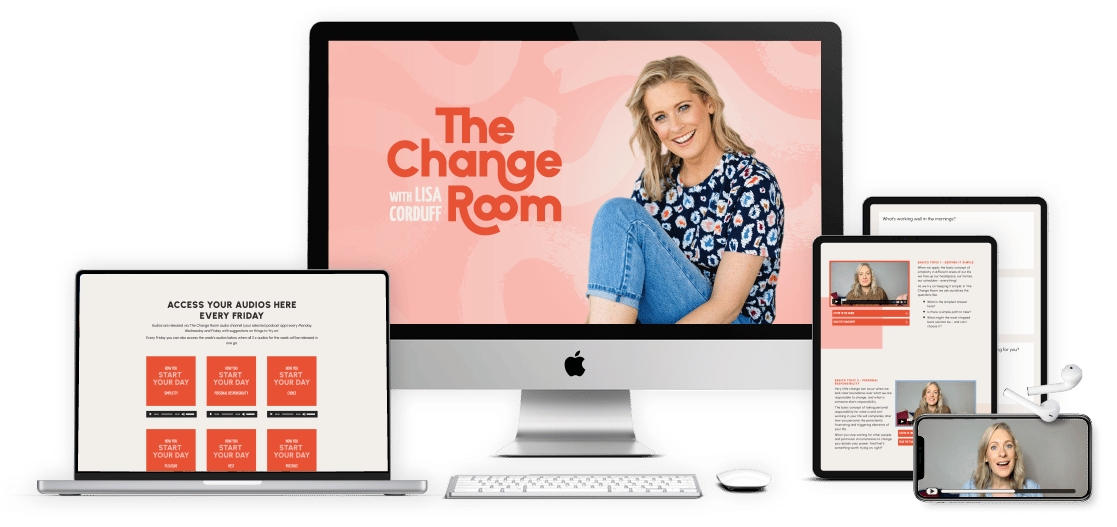
THE CHANGE ROOM
IT ALL STARTS WITH THE CHANGE ROOM.
You’ve changed, I’ve changed and it’s time to upgrade. Fun. Unpretentious. Easy. I can’t wait to welcome you inside The Change Room.
...WHAT ARE YOU WAITING FOR?

